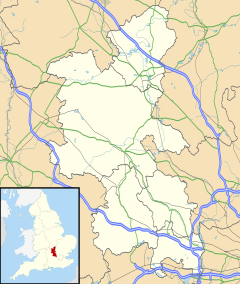Grendon Underwood Junction
| Grendon Underwood | |
|---|---|
 St. Leonard's parish church |
|
| Grendon Underwood shown within Buckinghamshire | |
| Population | 1,625 (2011 Census) |
| OS grid reference | SP685205 |
| District | |
| Shire county | |
| Region | |
| Country | England |
| Sovereign state | United Kingdom |
| Post town | Aylesbury |
| Postcode district | HP18 |
| Dialling code | 01296 |
| Police | Thames Valley |
| Fire | Buckinghamshire |
| Ambulance | South Central |
| EU Parliament | South East England |
| UK Parliament | |
| Website | Grendon Underwood, Buckinghamshire |
Grendon Underwood is a village and civil parish in Aylesbury Vale district in Buckinghamshire, England. It is in the west of the county, close to the boundary with Oxfordshire and near the Roman road Akeman Street now known as the A41. The village sits between Woodham and Edgcott and has a population of approximately 1500 (in 2012).
The toponym is derived from the Old English for 'green hill near a wood', though the 'Underwood' part of the name was only added in the medieval period to differentiate the village from nearby Long Crendon and to signify the village's position close to the Bernwood Forest. The Domesday Book of 1086 records the village as Grennedone. The manor of Grendon anciently belonged to the St Amand family. Almeric de St Amand of this family was one of the godfathers of King Edward I, who was baptised in 1239.
In 1642, Grendon Underwood lay on the forest tracks used by gypsies and strolling players (travelling performers) and was visited more than once by William Shakespeare, who stayed at the house, formerly an inn, now known as Shakespeare House, currently (2012) a five star guest house and Grade II listed, part Elizabethan former coaching inn. Built in 1906, Grendon Underwood Junction was the point at Greatmoor, just east of Grendon Underwood village, at which the Alternative Route of the London Extension of the Great Central Railway left the original main line. This was a little north of the former Quainton Road railway station. The lines were closed to passenger trains in 1966 but subsequently used by freight trains.
...
Wikipedia

